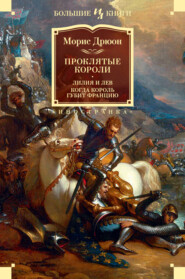По всем вопросам обращайтесь на: info@litportal.ru
(©) 2003-2025.
✖
The Iron King
Автор
Год написания книги
2019
Настройки чтения
Размер шрифта
Высота строк
Поля
‘You’re lying,’ said Philippe. ‘Prudence is a good pretext for getting rid of one lover in order to receive others.’
She was not altogether lying. It is always towards the end of an affair, when lovers either begin to quarrel or get bored with each other, that they betray themselves to those about them, and that the world takes for something new what is in fact upon the point of coming to an end. Had Marguerite said something careless? Had Philippe’s ill-temper been noted beyond the narrow world of Blanche and Jeanne? She felt absolutely certain of the porter and the chambermaid of the tower. They were two servants she had brought from Burgundy and whom she terrified with threats upon the one hand, and rewarded handsomely upon the other. But could one ever be certain? She felt that she was vaguely suspected. The King of Navarre had made several allusions to her success, husband’s jokes which did not quite ring true. And then there was this new woman-of-the-bedchamber, Madame de Comminges, who had been forced upon her a few days ago in response to a recommendation from Monseigneur Charles of Valois. She was always trailing about in her widow’s weeds. Marguerite felt herself less ready to take risks than in the past.
‘You know, you’re a bore,’ she said. ‘I love you and you never stop scolding me.’
‘Well, I shall have no opportunity to be a bore tonight,’ Philippe replied. ‘The King told us himself that there was to be no Council, so you’ll have all the time in the world to reassure your husband.’
From her expression Philippe could have guessed, had he not been so angry, that from that quarter at any rate he had nothing to fear.
‘And I shall go and visit the whores!’ he said.
‘All right,’ said Marguerite. ‘I shall be delighted to know how they set about things.’
‘Bitch! Bitch! Bitch!’ thought Philippe. You never knew how to take her; she was as slippery as an eel.
She went to an open coffer, and took out a new purse of gold thread with three catches made of large precious stones. Philippe had never seen it before.
Two days earlier Marguerite had received it as a present from her sister-in-law, the Queen of England, by the hand of a discreet messenger who had brought two similar purses for Jeanne and Blanche. A note from Isabella asked them not to talk of them, for ‘my husband watches carefully over my expenditure, and it might anger him.’
The three princesses had been somewhat surprised by their sister-in-law’s unaccustomed kindness. ‘She’s having trouble at home,’ they said to each other, ‘and wants to be in our good books.’
‘They go splendidly together,’ said Marguerite, passing the girdle through the golden loops, holding it against her waist, and going to look at herself in a huge pewter mirror.
‘Who gave you that purse?’ asked Philippe.
‘It was …’
She was quite simply going to tell him the truth. But she saw him stiffen with suspicion and was unable to resist teasing him.
‘It was … someone,’ she said.
‘Who?’
‘Guess.’
‘Louis?’
‘My husband isn’t as generous as that!’
‘Then, who?’
‘Can’t you guess?’
‘I want to know. I have the right to know,’ Philippe said, losing his temper. ‘It’s a present from a man, a rich man, a man in love … and because you’ve given him reason to be so, I should think.’
Marguerite went on looking at herself in the mirror, first trying the belt on one side, then on the other, then in the middle of her waist.
‘It was Robert of Artois,’ said Philippe.
‘Oh, what bad taste you credit me with, Messire!’ she said. ‘That great lout, always smelling of game.’
Neither of them imagined how near they were to the truth, and what part Robert of Artois had played in the sending of the purse.
‘Gaucher de Châtillon, then,’ said Philippe. ‘He’s always hovering round you as he does round every woman he sees.’
Marguerite put her head on one side as if lost in thought.
‘The High Constable?’ she said. ‘I hadn’t noticed that he was interested in me, but since you tell me that he is … Thank you for drawing my attention to it.’
‘I shall find out in the end.’
‘When you’ve named everyone at the Court of France …’
She was going to add, ‘Then perhaps you’ll think of the Court of England.’ But she was interrupted by the return of Madame de Comminges, who entered, pushing before her the Princess Jeanne, still almost an infant. The little girl walked slowly, made awkward by a long velvet dress embroidered with pearls. She bore no resemblance to her mother except for her round, swelling, almost convex brow. She was fair, had a thin nose and long eyelashes which fluttered over clear eyes. She might equally have been the daughter of the King of Navarre or of Philippe d’Aunay. But on that point, too, Philippe had never been able to discover the truth, and Marguerite was much too clever ever to give herself away on so important a matter. Every time Philippe saw the little Jeanne, he asked himself, ‘Is she mine?’ And he thought that one day he would have to bow as he received the orders of a princess who was perhaps his daughter and might well succeed to two thrones. For Louis of Navarre, the heir of France, and Marguerite his wife, had so far no other children.
Marguerite picked up the little Jeanne, kissed her forehead, and commenting that she looked well, handed her back to the woman-of-the-bedchamber.
‘There, I’ve kissed her,’ she said. ‘You can take her away again.’
She became aware from Madame de Comminges’s expression that the latter perfectly understood that she had only been sent to fetch the child in order to get rid of her for a moment. ‘I must be relieved of this old woman,’ thought Marguerite.
A lady-in-waiting entered hurriedly, asking if the King of Navarre were there.
Вы ознакомились с фрагментом книги.
Приобретайте полный текст книги у нашего партнера:
Приобретайте полный текст книги у нашего партнера:

















